-
Title
-
Voices of a Black Nation: Political Journalism in the Harlem Renaissance
-
This edition
-
"Voices of a Black Nation: Political Journalism in the Harlem Renaissance". Ed. Theodore G. Vincent. Foreword Robert Chrisman. San Francisco: Ramparts Press, 1973. 391 pp.
-
Other editions, reprints, and translations
-
Repr. Africa World Press, 1991.
-
Table of contents
-
● Robert Chrisman / Foreword
● Theodore G. Vincent / Preface
I. The Emerging New Negro
1. General Trends and Issues
● A. Philip Randolph and Chandler Owen / A Thanksgiving Homily to Revolution
● W. Allison Sweeney / Urging Blacks to Move North
● Chandler Owen / The Failure of the Negro Leaders
● Calvin Chase / A Report from the Tulsa Riot Scene
● Anon. / The Burning Alive of John Henry Williams (from "Washington Eagle")
● Carl Murphy / From the Lynch Mob to the Legal Lyncher of the Courts
● Julius A. Taylor / Restrictive Covenants
● Anon. / The Klu Klux Klan in Watts (from "California Eagle")
● Kelly Miller / Looking Backward: The Negro in 1931
● Joseph D. Bibb / America on Trial
● Cyril V. Briggs / Evictions and Rent Strikes
2. The Spirit of the New Negro
● Cyril V. Briggs / The Old Negro Goes: Let Him Go in Peace
● Roscoe Dunjee / The New Negro
● William N. Colson / The New Negro Patriotism
● George S. Schuyler / The Integrationist Vision
● Amy Jacques Garvey / The Value of Propaganda
● Anon. / The Spirit of the New Negro (from "Amsterdam News")
● Anon. / The Hope and the Promise of Harlem (from "New York Dispatch")
II. Questions of Ideology
3. Black Identity Old Style and New Style
● W. E. B. Du Bois / Returning Soldiers
● William Bridges / Six Demands
● Anon. / "I Am Prejudice" (from "Challenge")
● Robert L. Vann / Americanism
● W. E. B. Du Bois / The NAACP and the Class Struggle
● Chandler Owen / Du Bois on Revolution: A Reply
4. DuBois and Garvey
● W. E. B. Du Bois / What Du Bois Thinks of Garvey
● Marcus Garvey / What Garvey Thinks of Du Bois
● Marcus Garvey / W. E. B. Du Bois as a Hater of Dark People
● W. E. B. Du Bois / Marcus Garvey: A Lunatic or a Traitor?
● James Weldon Johnson / An Analysis of Garvey
● Marcus Garvey / Garvey Replies: "I Demand Social Justice"
5. Socialist Opposition to Black Nationalism
● A. Philip Randolph / Garveyism
● A. Philip Randolph / The Only Way to Redeem Africa
● A. Philip Randolph / Battling Du Bois vs. Kid Garvey
6. The African Blood Brotherhood
● Cyril V. Briggs / A Race Catechism
● Cyril V. Briggs / The Blood of Africa
● J. Griffith / Black Supremacy
● Cyril V. Briggs / Declaration of War on the Ku Klux Klan
● Rose Pastor Stokes / The Cause of Freedom: Blacks and Communists
7. Self-Defense against White Violence
● Hubert Harrison / A Call to Arms
● Anon. / Race Riot in Knoxville: Uncle Tom is Dead (from "The Veteran")
● Marcus Garvey / Soldiers of Ethiopia
8. Opinions on White Helpers
● William Pickens / The LaFollette Progressive Party of 1924
● Chandler Owen / White Supremacy in Organized Labor
● W. E. B. Du Bois / Radicals and the Negro
● Ernest E. Mair / The Hypocrisy of White Liberalism
● Amy Jacques Garvey / Labor at the British Helm
● W. A. Domingo / The Position of Blacks in the Revolutionary Struggle
9. Garveyism and the Question of National Loyalty
● Marcus Garvey / The Emancipation of the Race
● T. Thomas Fortune / A Man Without a Country
● Marcus Garvey / Sacrifices for Africa
10. A Columnist Is Caught between the NAACP and the UNIA
● Floyd J. Calvin / The NAACP vs. the UNIA
● Floyd J. Calvin / The Straw That Broke the Camel's Back
● Hubert Harrison / In Defense of Calvin
11. Communists in the 1930s
● Cyril V. Briggs / The Black Belt Republic Plan
● Langston Hughes / An Open Letter to the South
● James W. Ford / The Scottsboro Case
● William H. Davis / The Communists and the Scottsboro Case
● T. R. Poston / March on Washington: 1
● William H. Davis / March on Washington: 2
12. Communists and Garveyites
● George Padmore / The Bankruptcy of Negro Leadership
● Arthur S. Gray / On Capitalism: 1
● George Padmore / On Capitalism: 2
● George Padmore / Garveyism in the West Indies
● Cyril V. Briggs / How Garvey Betrayed the Negroes
● Cyril V. Briggs / Our Approach to the Garveyites
13. Black America Looks at Communism
● Joseph D. Bibb / Red and Black
● William N. Jones / Self-Determination: The Black Belt Republic Plan
● Anon. / Negro Editors on Communism: A Symposium (from "The Crisis")
● W. E. B. Du Bois / Marxism and the Negro Problem
14. Black Nationalism during the Depression
● Samuel A. Haynes / The Vision and Victory of Garvey
● W. E. B. Du Bois / On Segregation: 1
● Walter White / On Segregation: 2
III. Economic Issues
15. Blacks and the Trade Union Movement
● W. E. B. Du Bois / The Black Man and the Unions
● A. Philip Randolph and Chandler Owen / Blacks Need the IWW
● Ben Fletcher / IWW Needs Its Black-Led Unions
● Robert S. Abbott / Blacks and Trade Unions
● A. Philip Randolph and Chandler Owen / A United Negro Trades
● A. Philip Randolph / The New Pullman Porter
● A. Philip Randolph / The Brotherhood: United We Stand
● Charles S. Johnson / "Instincts" in Industry: Black and Chicano in L. A.
16. The Black Business Community
● Fred R. Moore / Big Business in Harlem
● A. Philip Randolph / The Crisis in Negro Business
● Chandler Owen / Problems of Black Business
● George Schuyler / On Economic Cooperatives
● Anon. / Unemployment Among Negroes: Whom Should We Blame? (from "Negro World")
● Anon. / South of the Rio Grande (from "The Messenger")
● Anon. / Don't Buy Where You Can't Work: A Call for a Boycott (from the New York "Interstate-Tattler")
● Robert L. Vann / Back to the Farm?
IV. The Black American and the Third World
17. Pan-Africanism vs. Africa for the Africans
● W. E. B. Du Bois / Africa for the Africans
● James Weldon Johnson / The African Question and the Rights of the Negro
● Marcus Garvey / The African Republic and White Politics
● William Sherrill / Liberia, Land of Opportunity
● W. E. B. Du Bois / Pan-Africa
● W. E. B. Du Bois / Manifesto of the Second Pan-African Congress
18. The Afro-American Press on the Third World
● Robert L. Vann / On Gandhi: An Empire at Stake
● Cyril V. Briggs / On Intervention in Mexico
● Clements Kadalie / Keeping the Nigger in His Place: White Labor in Africa
● Amy Jacques Garvey / Awakened Asia
● George Padmore / The Japanese Invasion of Manchuria
● William H. Ferris / Duse Mohamed
● Anon. / Liberia and the World War (from "African Times and Orient Review")
19. Africa and the Afro-American: An Editorial Debate
● George S. Schuyler / Pan Africanism: A Waste of Time
● Samuel A. Haynes / Pan Africanism: A Mighty Force
● George S. Schuyler / Pan Africanism: A Wild Scheme
● Samuel A. Haynes / Pan Africanism: The One and Only Way
20. The Liberian-American Plan
● William N. Jones / Afro-America Must Help Liberia
● Anon. / Launching the Liberian-American Plan (from the "Afro-American")
● William N. Jones / Liberia Today and Tomorrow
V. The Harlem Renaissance.
21. The Blooming of the Renaissance
● William Ferris / The Arts and Black Development
● Anon. / "The Village Lynchsmith" (from "New Negro")
● Archibald H. Grimke / "Her 13 Black Soldiers"
● A. Razafkeriefo [Andy Razaf] / "Don't Tread on Me"
● Jessie Fauset / Black Poetry: 1
● Theophilus Lewis / Black Poetry: 2
● Bennie Butler / Conning the Ofay: White Revelers in Harlem
22. Black Nationalist Intellectuals
● William Pickens / Hubert Harrison, Sidewalk Philosopher
● Arthur A. Schomburg / "The Negro in Our History" (excerpt)
● William H. Ferris / "Darkwater" (excerpt)
● Duse Mohamed Ali / The Dunbar Players, Where Black Is White
● John Edward Bruce / King Tutankhamen, Black Egyptian
23. "Home to Harlem" and Other Works
● Alain Locke / 1928: A Retrospective Review
● James W. Ivy / "Home to Harlem": A Slice of Life
● Marcus Garvey / "Home to Harlem": An Insult to the Race
● W. E. B. Du Bois / "Home to Harlem" and "Quicksand"
24. The Press and the Church
● Bishop Robert E. Gross / Stand True to American Life
● William Pickens / The Church and the People
● Rev. R. R. Porter / Garveyism: A Religion
● Amy Jacques Garvey / Christianity in Africa
● Anon. / The Church Ethiopic (from "Negro World")
● Samuel Haynes / The Decline of Marcus Garvey and the Rise of the New Isms
VI. Toward the Future
25. Toward the Future
● Amy Jacques Garvey / Black Is Beautiful
● Amy Jacques Garvey / The Tidal Wave of Oppressed People Beats Against the Color Line
Appendix [Black American news agencies, magazines, and newspapers of general interest news and literature, from WWI to early 1930s]
Index
-
About the anthology
-
● Presents over 100 newspaper articles "selected from the Negro press of the Harlem Renaissance (1917-34)"; includes an index.
-
● Does not gloss or annotated the selections but provides background information about the authors and the selections in headnotes to each of the 25 sections of the anthology and in the preface.
-
Anthology editor(s)' discourse
-
● Some of the material in the headnotes provides more general commentary. For example, the headnote to section 1, "General Trends and Issues," sets the stage for the black Renaissance by discussing the "'great migration' of rural blacks to northern cities," with the "pull" factors of the labor shortage for northern industries created by the First World War cutting off the flow of European immigrants and the black press promoting the migration (43). "There were some four dozen major race riots between 1916 and 1921, twenty-six alone in the 'Red Summer' of 1919, when city after city was bathed in blood. Almost all of these confrontations occurred in border or northern states; if there was any pattern here it was the attempt of white mobs to terrorize blacks and reduce them in the cities to the position they had long held in the rural South" (44).
-
● In the headnote to section 2, "The Spirit of the New Negro," Vincent discusses the emergence and history of the term "New Negro," arguing that it originated with (left-wing and black nationalist) political radicals as a critique of "traditional black leadership" (62), but that it eventually came to be "co-opted by that very middle class which by radical definition was 'Old Negro'" (63). Originally, Vincent argues, the "'New Negro' title was coveted by nationalist, leftist, and angry young reformers. The title was proudly claimed for those who fought to defend black communities during the 1919 race riots [as in a 1919 article by Cyril Briggs, "one of the early black Marxists"]"; it also expressed the outlook of "the black veterans of the [First] World War" and of black critics of "the traditional American system of justice" (62). "The optimism of New Negro radicals was in no small part attributable to their discovery of the power of psychological warfare. Among New Negro black nationalists, the war to liberate the mind from debilitating self-hate was seen as the first and most important step on the way to total liberation" (63). But, as noted above, Vincent argues that the "New Negro label was gradually co-opted by that very middle class which by radical definition was 'Old Negro.' Black who denounced radicals of all stripes commercialized the concept into a distinction between 'new' aggressive individualists who capitalized on the social changes that came with the move to the city, and the lethargic Negro of the Old South" (63).
-
Reviews and notices of anthology
-
● Bashira, Damali. "A Current Bibliography on African Affairs" 8.2 (1975): 148.
-
● Harris, Virginia. "Library Journal" 98 (15 Dec. 1973): 3634.
"Major emphasis is placed on the development of the 'New Negroes' recently emerged from the South. . . . The crucial conflict between separatists and integrationists is continuously reiterated, highlighted by the Garvey-DuBois and Haynes-Schuyler feuds. Most striking are the parallels between the ideas of this period and those of today's militant black movement. Vincent's selection is able, his preface perceptive, and his introductory chapter notes useful. For academic libraries and for public libraries with an aware clientele."
-
Commentary on anthology
-
● Franklin, V. P. "The Power to Define: African American Scholars, Activism, and Social Change, 1916-2015." "Journal of African American History" 100.1 (2015): 1-25.
"The 1920s witnessed the flowering of the black press, and African American journalists represented the New Negro vanguard. A generous sampling of New Negro political journalism can be found in Theodore G. Vincent’s 'Voices of a Black Nation' (1973), with articles and excerpts from newspapers and magazines on 'The Emerging New Negro,' 'Questions of Ideology,' 'Economic Issues,' and related topics. While Vincent includes a section on 'The Harlem Renaissance,' we now know the New Negro cultural and literary movement was not confined to Harlem, or even the United States, in the 1920s; and what occurred was actually a political and literary renaissance with sites of cultural and political activism in Chicago; Philadelphia; Washington, DC; Detroit; Atlanta; Havana, Cuba; Port-au-Prince, Haiti; and Rio de Janeiro and Sao Paulo, Brazil" (9).
-
Item Number
-
A0569
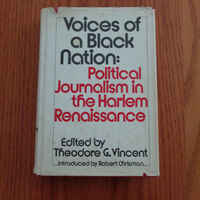 Front cover (1973 ed.)
Front cover (1973 ed.)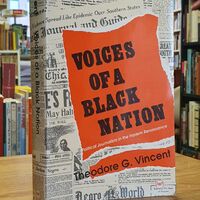 Front cover and spine (hardcover) (1991 ed.)
Front cover and spine (hardcover) (1991 ed.)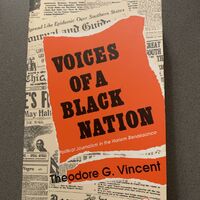 Front cover (paperback) (1991 ed.)
Front cover (paperback) (1991 ed.)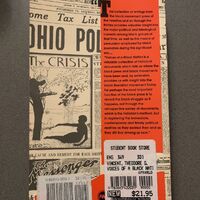 Back cover (paperback) (1991 ed.)
Back cover (paperback) (1991 ed.)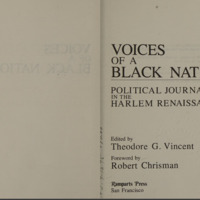 Title page
Title page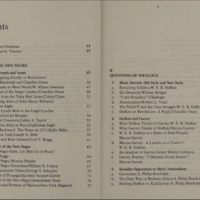 Table of contents 1
Table of contents 1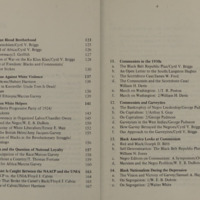 Table of contents 2
Table of contents 2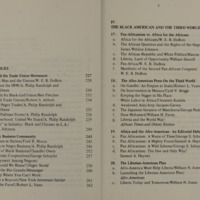 Table of contents 3
Table of contents 3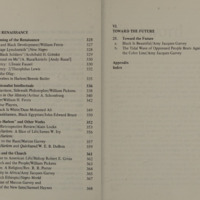 Table of contents 4
Table of contents 4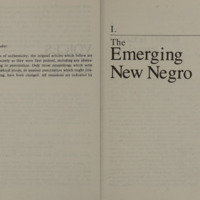 Sample page image (note to reader & section half-title]
Sample page image (note to reader & section half-title]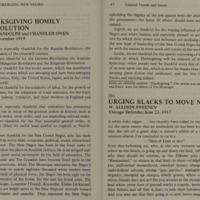 Sample page image (pp. 46-47)
Sample page image (pp. 46-47)









